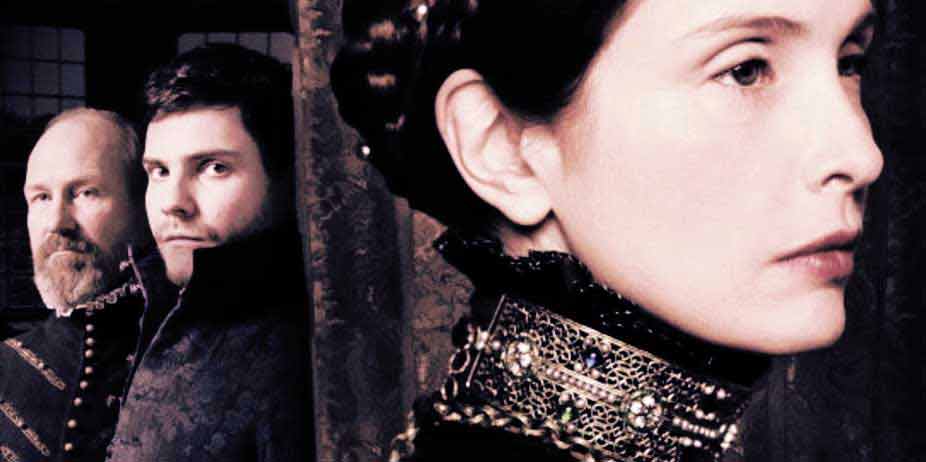
The Countess (2009)
Have you ever heard of Countess Bathory? She was an infamous Hungarian aristocrat accused of murdering virgins and bathing in their blood during the Elizabethan era. This foreign-produced but English-speaking film tries to explain her side of the story...
From childhood, Erzebet has been different from her peers: cruel, curious about death and growing old, and single-minded. Her youth and its romantic mistakes are swiftly swept aside in her arranged marriage to a powerful man with a great army to whom the kingdom owes much in its continued struggle against the invading Turks. As the most beautiful woman in the kingdom, Erzebet (Julie Delpy) is hardly traumatized when her warrior husband dies and immediately turns her attention elsewhere -- to the young and handsome Istvan (Daniel Brühl). But her love affair with him turns into obsession and then despair when he appears to abandon her in favor of a much younger woman. Little does Erzebet know that this was at the behest of his father Gyorgy (William Hurt), who hoped to win Erzebet's hand for himself. Her belief that her increasing age has come between them leads her to an obsession with remaining young that turns into madness when, purely by chance, she happens to strike one of her servant girls and the blood appears to soften her skin.
Murder, torture, and eventual discovery cloud the countess in a haze of suspicion and local superstition. The film is interesting in the sense that it is visually beautiful even though many of the surroundings are stark and uninteresting. It is lavish and lush in its costumes for the time period and the leading actress is fascinating to look at, with such an usual beauty that the audience is enticed into appreciation of it even as our horror increases at her evil actions. But the fact that the foreign actors are forced to speak in a language other than their own (English) means that the delivery of lines is halted and stiff, and often unrealistic. This makes the flaws in the poetic dialogue apparent: it doesn't sound realistic much of the time and doesn't do the actors any favors. But the script itself and the flow of the story is rather clever; it does use a narrator but it moves very fast in its first half hour, and then slows down for the more significant happenings of her life.
But that, sadly, is where my praise much end. Have you ever been confronted with sheer evil? What was your reaction? Shock? Disgust? Abhorrence? A feeling of repulsion? That was my reaction to this movie as it descended into sheer evil and debauchery with innocent young girls playing the victim. Where do I even begin? There's no real bad language to speak of, but there is some nudity in various romantic bedroom settings (a woman from the waist up several times, a naked man asleep on his side). Then there is the violence -- and the blood. As a child, Erzebet buries a bird alive and digs up its maggot-infested corpse later on. She is overcome with rage at one point and beats a servant girl brutally with a hairbrush, drawing blood. The poor girl is then enticed into offering more blood for her mistress' use -- we see her being bled numerous times, until she is finally tied to a chair and drained. The Countess invests in a torture device that bleeds women more fully. Corpses are taken to the church until they draw too much attention; then they are dumped in the woods, where wolves tear off pieces and eat them. We see a girl that has been chewed in half; another runs into a knife, the Countess slits several throats. Many times, we see her wiping blood all over her face and hands. In despair, when bricked up in her rooms, she gnaws into her wrist and dies in a pool of her own blood. She is romantically involved in a lesbian relationship with a witch, and is seen kissing her once (they also share a bed in one scene). One of her later lovers also convinces her to become involved in an S&M relationship (she is shown flogging him).
What makes it even more sickening is that in spite of her fornication, murder, association with witchcraft, and daily blood baths, the Countess maintains a piety in professing that God has shown her the way to defeat old age and death, thanking Him for these blessings and the blood of virgins. Her faith is repulsive and self-serving, stinking of evil and prejudice (she complains that as she is a woman, she cannot burn witches and win the approval of God as she might if she were a man). The longer it went on, the sicker I felt toward it and I was relieved when it finally ended. Some amateur historians have bashed this film for its skewed view of Bathory and its artistic license, some claiming that it does nothing more than take the charges and run with them, but that doesn't much matter to me... what does matter is that although this movie is visually appealing, it centers around a depraved and evil woman who committed some truly atrocious acts. I have no desire to revisit her again and if you are wise, you will avoid her too.
